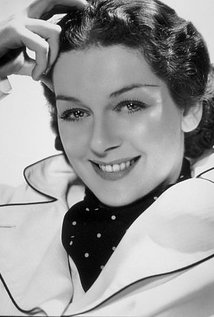Rosalind Russell (Catherine Rosalind Russell)

Rosalind Russell started her career as a fashion model and was in many Broadway shows. Against parental objections, she took a job at a stock company for seven months at Saranac Lake and then Hartford, Connecticut. Afterwards, she moved to Boston, where she acted for a year at a theater group for Edward E. Clive. Later, she appeared in a revue in New York (The Garrick Gaieties). There, she took voice lessons and built a career in the opera, which was short-lived due to her difficulty in reaching high notes. In the early 1930s, Russell went west to Los Angeles to be a contract actress for Universal Pictures. When she first arrived on the lot, she was ignored by most of the crew and later told the press she felt terrible and humiliated at the studio, which affected her self-confidence. Unhappy with Universal’s leadership, and second-class film status at the time, Russell set her sights on Metro-Goldwyn-Mayer (MGM) and was able to get out of her Universal contract on her own terms. When MGM first approached her for a screen test, Russell was not enthusiastic, remembering Universal. When she met MGM’s Benny Thau and Ben Piazza, she was surprised, as they were “the soul of understanding”. Her screen test was directed by Harold S. Bucquet, and she later recalled that she was hired because of a closeup he took of her. Picked up by MGM, Rosalind Russell debuted in Evelyn Prentice (1934). Although the role was small, she was noticed, with one critic saying that she was “convincing as the woman scorned”. She starred in many comedies such as Forsaking All Others (1934), and Four’s a Crowd (1938), as well as dramas, including Craig’s Wife (1936) (which would be the film’s second of three remakes; Joan Crawford did the third) and The Citadel (1938). Russell was first acclaimed when she co-starred with Robert Young in the MGM drama West Point of the Air (1935). One critic wrote: “Rosalind Russell as the ‘other woman’ in the story gives an intelligent and deft handling to her scenes with Young.” She quickly rose to fame and, by 1935, was seen as a replacement for actress Myrna Loy, as she took many roles Loy was initially set for.
Rosalind Russell approached director Frank Lloyd for help changing her image, but, instead of helping her, Lloyd cast her as a wealthy aristocrat in Under Two Flags (1936). In 1939, she was cast as catty gossip Sylvia Fowler in the all-female comedy The Women, directed by George Cukor. The film was a major hit, boosting her career and establishing her reputation as a comedian. Russell continued to display her talent for comedy in the classic screwball comedy His Girl Friday (1940), directed by Howard Hawks. In the film, a reworking of Ben Hecht’s story The Front Page, Russell played quick-witted ace reporter Hildy Johnson, who was also the ex-wife of her newspaper editor Walter Burns (Cary Grant). Russell had been, as she put it, “Everyone’s fifteenth choice” for the role of Hildy in the film. Prior to her being cast, Howard Hawks had asked Katharine Hepburn, Irene Dunne, Claudette Colbert, Jean Arthur, Margaret Sullavan and Ginger Rogers if they’d like to play the brash, fast-talking reporter in his film. All of them refused. Russell found out about this while riding on a train to New York, when she read an article in the New York Times saying that she’d been cast in the film and listing all the actresses who had turned the part down. In the 1940s, she made comedies such as The Feminine Touch (1941) and Take a Letter, Darling (1942), dramas including Sister Kenny (1946), and Mourning Becomes Electra (1947), and a murder mystery: The Velvet Touch (1948).
Over the course of her career, Rosalind Russell earned four Academy Award nominations for Best Actress: My Sister Eileen (1942); Sister Kenny (1946); Mourning Becomes Electra (1947); and the movie version of Auntie Mame (1958). She received a Special Academy Award, the Jean Hersholt Humanitarian Award, in 1972, which came with an Oscar statuette. Russell scored a big hit on Broadway with her Tony Award-winning performance in Wonderful Town (1953), a musical version of her successful film of a decade earlier, My Sister Eileen. Russell reprised her starring role for a 1958 television special. Perhaps her most memorable performance was in the title role of the long-running stage hit Auntie Mame and the subsequent 1958 movie version, in which she played an eccentric aunt whose orphaned nephew comes to live with her. When asked which role she was most closely identified with, she replied that strangers who spotted her still called out, “Hey, Auntie Mame!” She received a Tony Award nomination for Best Actress in a Play in 1957 for her performance. Patrick Dennis dedicated his second Auntie Mame book Around the World with Auntie Mame to “the one and only Rosalind Russell” in 1958. She continued to appear in movies through the mid-1960s, including Picnic (1955), A Majority of One (1961), Five Finger Exercise (1962), Gypsy (1962), and The Trouble with Angels (1966). Russell was the logical choice for reprising her role as Auntie Mame when its Broadway musical adaptation Mame was set for production in 1966, but she declined for health reasons. In addition to her acting career, Russell also wrote the story (under the name C. A. McKnight) for the film The Unguarded Moment (1956), a story of sexual harassment starring Esther Williams. Rosalind Russell died of breast cancer on November 28, 1976.[18] She was survived by her husband and her son. She is buried in Holy Cross Cemetery in Culver City, California. Rosalind Russell has a star on the Hollywood Walk of Fame, at 1708 Vine Street.
Born
- June, 04, 1907
- USA
- Waterbury, Connecticut
Died
- November, 28, 1976
- USA
- Beverly Hills, California
Cause of Death
- breast cancer
Cemetery
- Holy Cross Cemetery
- Culver City, California
- USA



